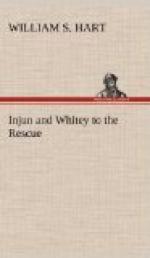“I ain’t exactly got no story in mind,” Bill replied. “We was talkin’ ‘bout folks, b’fore you an’ Injun come, an’ how they is apt t’ be unjust, ‘specially in th’ way o’ makin’ laws an’ such, an’ it kind o’ got me thinkin’ serious; kind o’ drove stories out o’ my head.”
“Why, John Big Moose was talking about that the other day,” Whitey exclaimed, “and how hard it is for one body of people to understand and sympathize with another, and about that sayin’, ’Man’s inhumanity to man makes countless thousands mourn.’ Of course, you know that saying. Bill?”
“‘Course,” answered Bill. “My father was allus mentionin’ of it.”
“Your old man was a blacksmith, wa’n’t he, Bill?” Buck Higgins asked.
“Sure.”
“Seems t’ me ’twould ‘a’ bin more in the way o’ sense if he’d talked ‘bout man’s unhumanness t’ hosses,” Buck said lightly.
Bill ignored this, and got back to the serious side of the subject. “It’s somethin’ t’ make a critter think,” he declared. “Take white folks an’ Injuns, f’r instance. They ain’t never rightly understood each other, ‘cause they ain’t never bin rightly in tune with each other, an’ that’s another way o’ sayin’ they ain’t bin in symp’thy. An’ th’ only way they could get that way would be t’ tell, outspoke, what they thinks o’ each other. Now they’s Injun, here. He’s bin our friend for some time, an’ we bin his, but no one ain’t never knowed his real ’pinion of us, an’ I think it’d be some help in adjustin’ matters all round if we did.”
Shielding his mouth with his hand, Shorty Palmer turned to Buck Higgins, and spoke in a hoarse whisper, that could be heard distinctly by everybody. “Bill’s like one o’ them big express trains you see at th’ Junction,” Shorty hissed. “Takes him some time t’ get started, but he gets somewheres when he does.”
Bill tried to look as though he hadn’t heard this, and turned to Injun, with what was supposed to be an expression of brotherly frankness on his face. “Just among friends, Injun, d’ye think white folks as a class stacks up perty good?”
Injun stared at Bill. “Huh,” he grunted. “Mebbe some good, mebbe some bad.”
“O’ course,” said Bill, “they’s good an’ bad ’mongst ’em, but I mean t’ stack ’em up against Injuns, as a whole tribe, see?”
“Injuns same way. Mebbe some good, mebbe some bad.”
This did not seem to be getting anywhere, and Bill became more personal. “Now, Injun, honest,” he said, “don’t you think your people are underdogs in these here conditions the whites have forced ’em into, an’ that they got a constant grouch against most whites?”
“My people good people. Him see straight,” Injun replied, with dignity.
Bill was sorry now that he had started on this line of attack. He knew that the Min-i-ko-wo-ju tribe, a branch of the Sioux or Dakotas, of which Injun was a member, had been treated very fairly by Mr. Sherwood, Whitey’s father. That largely through the influence of Mr. Sherwood, aided and abetted by John Big Moose, the educated Dakota, the Min-i-ko-wo-jus had come in for their share of the recently discovered gold mine. He also knew that gratitude was a strong factor in the Indian character.




